Since we've hit two milestones of late on the Mega Archive - 20 entries and 300 games processed - I've decided to switch up the format a little to make these blogs both A) easier to write, and B) easier to read. To that effect, each entry will now comprise of ten games on average, with slightly deeper dives for each. I'm still going to struggle to say much of anything of value about some Japanese-only licensed board game tie-in, but the part that's the most fun about working on the Giant Bomb wiki is scouring the internet for information, reviews, interviews, trivia, and other research and figuring out how best to concisely relay only the most pertinent and factually correct of that mess of data. Any other random nonsense that's not fit for the wiki page, including my own opinions, can be best dispensed here compiling these round-ups. Hopefully you agree and don't all pillory me whenever I go off on how lukewarm I am about Alex Kidd or Ecco the Dolphin, or some other mysteriously beloved Sega luminary.
As for today's dectet (decet? The word "dectet" always reminds me of Bulletstorm), we're still in the throes of a western-market-focused summer with a heavy emphasis on sports games. There's an oasis in the middle featuring some truly strange first-party Japanese licensed tie-ins, before we head back towards the occidental with a few more Amiga ports and our big headliner, which has already been spoiled by the title of the blog. It's Crüe Ball. Remember Crüe Ball? Well, we're doing Crüe Ball today.
Here are all the links to what we've covered previously, now in a fancy new table form:
| Part I: 001-020 (Oct '88 - Dec '89) | Part IX: 131-145 (May '91 - Jun '91) | Part XVII: 256-270 (Mar '92 - Apr '92) |
| Part II: 021-035 (Dec '89 - Mar '90) | Part X: 146-160 (Jun '91 - Jul '91) | Part XVIII: 271-285 (Apr '92 - Jun '92) |
| Part III: 036-050 (Apr '90 - Jul '90) | Part XI: 161-175 (Jul '91 - Aug '91) | Part XIX: 286-300 (Jul '92 - Aug '92) |
| Part IV: 051-065 (Aug '90 - Oct '90) | Part XII: 176-190 (Aug '91 - Sep '91) | Part XX |
| Part V: 066-080 (Oct '90 - Dec '90) | Part XIII: 191-205 (Oct '91 - Nov '91) | Part XXI |
| Part VI: 081-098 (Dec '90) | Part XIV: 206-220 (Nov '91) | Part XXII |
| Part VII: 099-115 (Jan '91 - Mar '91) | Part XV: 221-240 (Dec '91) | Part XXIII |
| Part VIII: 116-130 (Mar '91 - Apr '91) | Part XVI: 241-255 (Jan '92 - Feb '92) | Part XIV |
Part XX: 301-310 (August '92 - September '92)
301: Gadget Twins
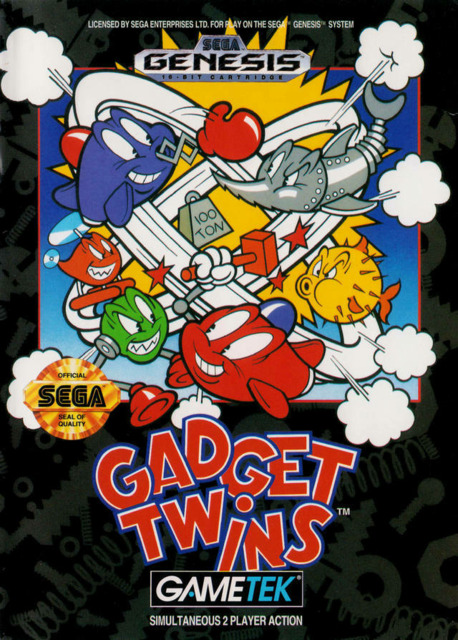
- Developer: Imagitec Design
- Publisher: GameTek
- JP Release: N/A
- NA Release: August 1992
- EU Release: N/A
- Franchise: N/A
- Genre: Shoot 'em Up (Multidirectional)
- Theme: Budget Fantasy Zone
- Premise: Bop and Bump are tasked by the King of All Airplanes to recover a magic gem that was somehow stolen despite being left unguarded and next to an open window. Truly a master criminal at work.
- Availability: It's on Steam, surprisingly. Released last year even.
- Preservation: The indomitable duo of Imagitec and GameTek return again after last entry's Wheel of Fortune (MA XIX) with this very Amiga-looking game (though as far as I know, it was Genesis exclusive until that Steam release) about a couple of sapient planes packed with gadgetry. We also have one of those rare, wonderful "all genres are stupid" moments here, as while the game has all the hallmarks of a shoot 'em up - you're flying around, enemies come at you in waves, mechanics revolve around weapon power-ups and dodging boss projectiles - most gadgets are melee-only, so you're not... actually... shooting them up? Either way, I don't think this game is very good. You have a health bar but no invincibility frames, so if an enemy gets close enough to sit on your face your health drains to nothing almost instantly. It also looks like it was made in MS Paint, and I don't mean that in a good way if indeed there is a good way in which to take it. Some random IP holder thought it was worth exhuming and dropping on the Steam store though, so who am I to argue?
302: Evander Holyfield's "Real Deal" Boxing
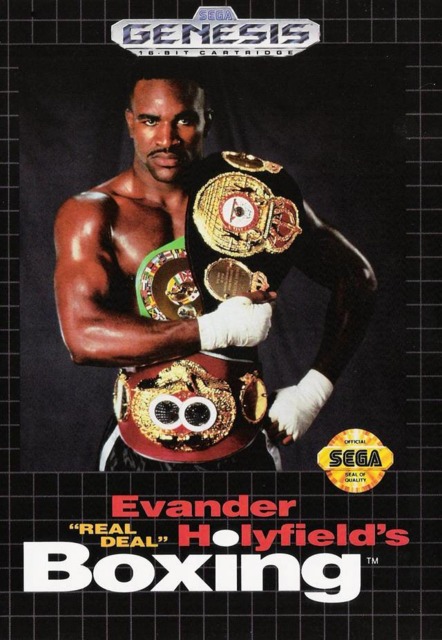
- Developer: ACME Interactive
- Publisher: Sega
- JP Release: 1992-10-30
- NA Release: August 1992
- EU Release: 1992-09-24
- Franchise: N/A
- Genre: Boxing
- Theme: Punching People Really Hard
- Premise: Real Deal Boxing is like regular boxing, only you're more likely to find it in the bargain bin at 75% off. Now that's what I call a real deal.
- Availability: Sports games have a very limited shelf life; celebrity-endorsed ones even more so. There was a Game Gear version released around the same time, if you were looking for a downgrade to an already mediocre game. And who wouldn't be?
- Preservation: The first of many sports games this entry, Sega's next answer to Punch-Out!! involves Alabama's answer to Mike Tyson, the titular Real Deal himself Evander Holyfield. This isn't the first boxing game with a celebrity endorsement to come out on the Sega Genesis - we saw James "Buster" Douglas Knockout Boxing all the way back in 1990 (MA II) - but there's a significant difference between that game and this: Knockout Boxing was an arcade game first that was ported over by Taito, while Real Deal Boxing was built specifically to take advantage of the Genesis's tech. I say that, but besides some fancy parallax business at the start of a round as it spins around the ring, there's not much more to this boxing sim than there is in the others. It does have a semi-involved "career mode" with a player-created boxer however, which is commonplace now but still novel at the time.
303: Team USA Basketball
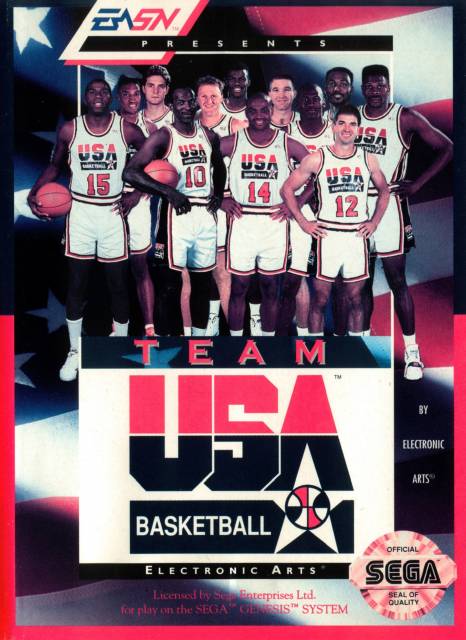
- Developer: Electronic Arts
- Publisher: Electronic Arts
- JP Release: 1992-12-26 (as Dream Team USA)
- NA Release: August 1992 (as Team USA Basketball)
- EU Release: December 1992 (as Team USA Basketball)
- Franchise: N/A
- Genre: Basketball
- Theme: Slamming and/or Jamming, Only Nationally
- Premise: Unlike most basketball games which stick to the NBA or NCAA, this follows the national American team as they take part in a rough approximation of the 1992 Summer Olympics tournament.
- Availability: Unless the 1992 Olympics happens again any time soon, and I doubt it seeing as we couldn't even get the 2020 Olympics going in 2020, this is probably going to stay a limited time thing.
- Preservation: This has to be one of very few sports games with national teams to include The CIS, which was what the USSR turned into after it dissolved. It still exists, sort of like the EU but with a more easterly bent, but its member states all joined international sports competitions (like the Olympics or the World Cup) as individual countries after 1992. Beyond that geographical anomaly, it's really just another EA Sports basketball game built in the NBA Playoffs model that takes advantage of the hype around the "all-star" international team the USA entered into the 1992 Olympics in Barcelona: Michael Jordan, Scottie Pippen, Charles Barkley, Larry Bird, Patrick Ewing, Karl Malone, Magic Johnson, Chris Mullin, and others went on to completely dominate the men's Olympics competition that year, to no-one's real surprise. It might still be one of the few basketball games out there (certainly from EA Sports) to acknowledge that the rest of the world plays it too, albeit not quite as well.
304: World Class Leaderboard Golf
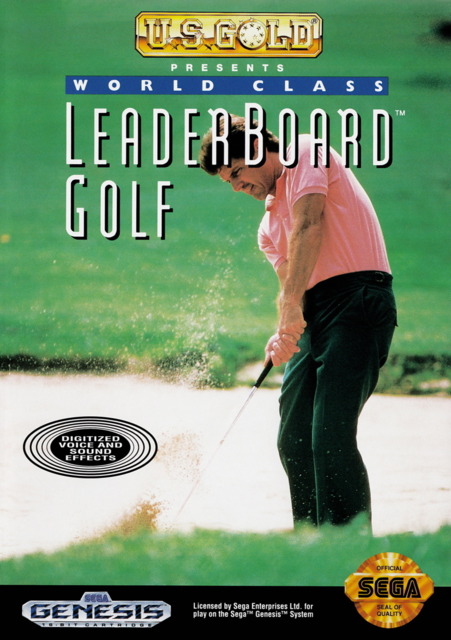
- Developer: Access Software
- Publisher: US Gold
- JP Release: N/A
- NA Release: August 1992 (as World Class Leaderboard Golf)
- EU Release: December 1992 (as World Class Leader Board)
- Franchise: Leader Board
- Genre: Golf
- Theme: The Majesty of Ball Chess
- Premise: Try your luck on a few real-life golf courses in this traditional golf sim from a franchise that originated on 8-bit computers.
- Availability: Nothing doing. When realism is your chief concern, your sports game is destined to age like fine milk.
- Preservation: I would be ever so slightly fascinated by a breakdown of golf games from the 16-bit era, in particular the way the genre is beginning to fracture further between simulation-heavy games like World Class Leaderboard here where realism is king and you can almost smell the grass clippings, and the more jovial Mario Golfs and Everybody's Golfs of the genre which go out of their way to shift the physics and particulars of the real-world equivalent to more befit a fun and breezy video game experience. I have less to say about World Class Leaderboard itself, since it's of a type similar to a few others in the 1990s where it's experimenting with a pseudo-3D perspective (though, it should be said, this interface is distinct to the Genesis version as far as I can tell) that proves to be more obfuscating than intended. For a sim-heavy game, there's not a whole lot of feedback either: no indication of how far a shot will go based on where you hit on the power gauge, no automatic club-switching (it'll just switch to a 2-Iron as default after the initial drive, which won't help if you've almost driven the green and didn't notice which club you have out), and the voiceover clips - which only seem to trigger on water hazards, bunkers, or hitting the ball into trees - feel more like they were included to troll you. Could just be that it's a very early golf game, as the sequel to a 1986 C64 original, and so not as feature-rich as you'd hope even for 1992.
305: Hyokkori Hyoutanjima: Daitouryou wo Mezase!
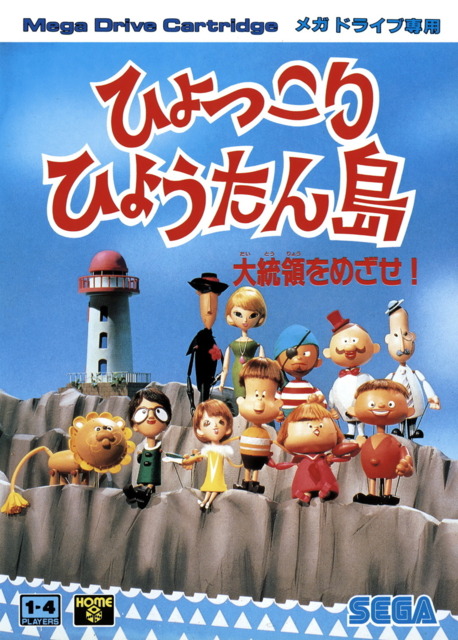
- Developer: Sega
- Publisher: Sega
- JP Release: 1992-08-07
- NA Release: N/A
- EU Release: N/A
- Franchise: Hyokkori Hyoutanjima
- Genre: Board Game
- Theme: Creepy Marionettes
- Premise: For the show? Good question. Its synopsis reads like some insane version of Gilligan's Island crossed with The Magic Roundabout. For the game? You move around a board and random shit happens, like every Japanese video board game.
- Availability: Gonna go out on a limb and suggest that an English localization of this game is unlikely.
- Preservation: Uhhh... what the hell is this? Well, it appears to a video game adaptation of a 1960s Japanese TV puppet show that Sega themselves chose to bring to life, similar to a much earlier first-party licensed game from the Mega Drive's salad days called Osomatsu-kun: Hachamecha Gekijou (MA I). In both cases, they're shows meant for pre-teen children, which suggests Sega of Japan's perception of the Mega Drive's target demographic is considerably different to Sega of America's. The US (and Europe) have a couple of standbys when handling a licensed property, in case the source itself doesn't inspire any ideas: platformers and kart racers. In Japan, it's usually instead match-3 puzzle games and board games. I didn't get too far here, but it strongly resembles Namco's Chibi Maruko-chan: Waku Waku Shopping from earlier this same year (which was also based on a TV show for kids). The game's subtitle translates to "Aim to be President!" so it turns out to be a little more topical than I expected.
306: Nekketsu Koukou Dodgeball-bu Soccer-hen MD
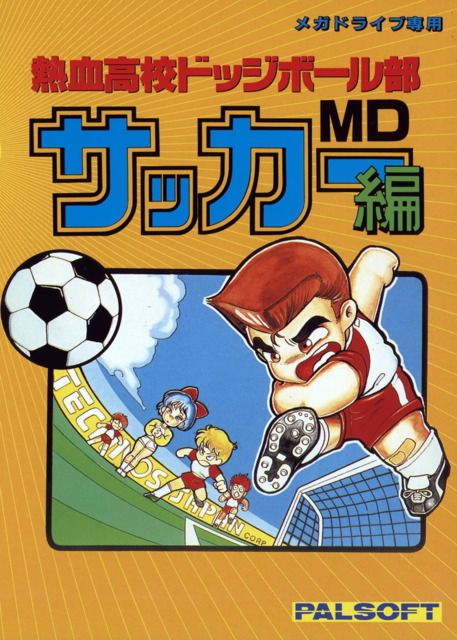
- Developer: Aspect
- Publisher: PalSoft
- JP Release: 1992-08-07
- NA Release: N/A
- EU Release: N/A
- Franchise: Kunio-kun
- Genre: Soccer
- Theme: Hotbloodedness
- Premise: Soccer is kinda like dodgeball, if you couldn't use your hands and your "opponent" was a net. OK, so it's not really like dodgeball at all, but I guess the brand was too strong to leave dodgeball out of the title.
- Availability: This came out on everything at the time, and on the Wii Virtual Console much later.
- Preservation: You know what I didn't expect to see come up during this feature? Nintendo World Cup. Yet here it is, on a Sega platform. Truth be told, it's not like Technos had sworn to only produce games for Nintendo platforms, even if they weren't ultimately involved with this particular port. Whether you've played Nintendo World Cup or not, you hopefully know enough about the Kunio-kun franchise - which started as brawlers, including Renegade and River City Ransom - to know that this game is a cartoonishly brutal free-for-all twist on the beautiful game where players are left unconscious where they lie after being tackled too hard, and that each team has their own finite-use superpowered bicycle kicks to punch holes in the opponent's defense (though not literally; it's not that violent).
307: Shura no Mon
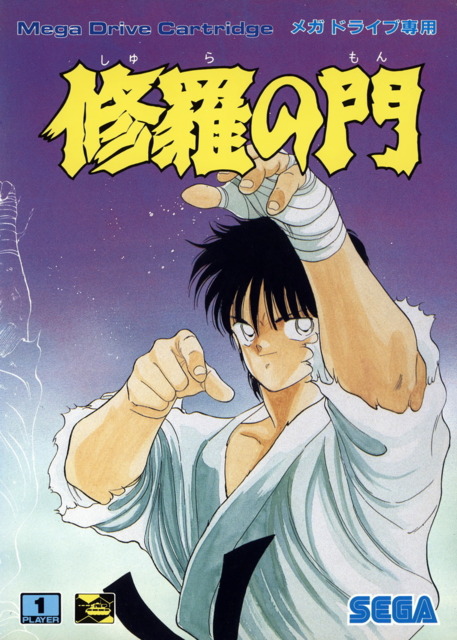
- Developer: SIMS
- Publisher: Sega
- JP Release: 1992-08-07
- NA Release: N/A
- EU Release: N/A
- Franchise: N/A
- Genre: Turn-based Sports
- Theme: Martial Arts Manga
- Premise: Fight your way to the top of the martial arts circuit and be the best karate kid around in this adaptation of Masatoshi Kawahara's manga.
- Availability: It's another first-party licensed tie-in so I doubt we'll see a revival.
- Preservation: Shura no Mon seems pretty standard as shounen martial arts manga go, with the hero constantly on the precipice of defeat before some flash of inspiration or moxie gets them through a seemingly impossible bout. What's uncommon about this licensed tie-in is that it pre-empts any anime adaptations: manga on its own is still very popular in Japan, but most of the time it's some other form of multimedia (an anime series, movie, or OVA, or maybe even a live-action thing) that inspires a video game accompaniment - striking while the pop cultural iron is hot, as it were. I've seen this particular style of fighting game before too, where it's more about strategy and menus than it is actually tapping buttons and quarter-motions to hit people. The 16-bit YuYu Hakusho games were very fond of it. If I had to guess why this format exists, it's because in manga form something as instantaneous as a counter-hit might take five pages of inner struggle and contemplation and a flashback to some training session with the protagonist's deceased friend that reminds him of the current scenario, and the developers wanted to give players a similar amount of time "in the moment" to think about their next action.
308: The Aquatic Games starring James Pond and the Aquabats
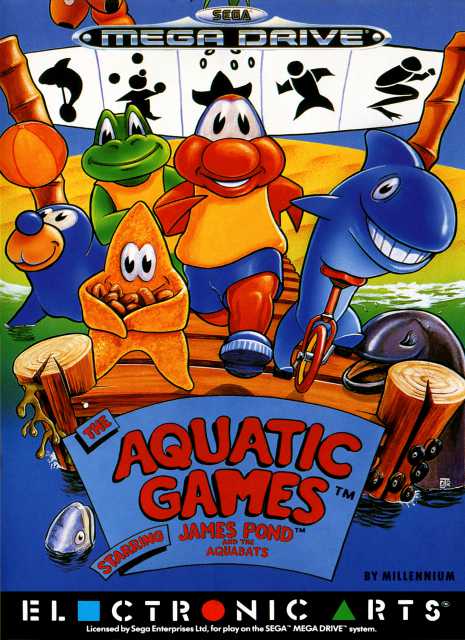
- Developer: Millennium Interactive
- Publisher: Electronic Arts
- JP Release: N/A
- NA Release: September 1992
- EU Release: October 1992
- Franchise: James Pond
- Genre: Sports
- Theme: Water Sports*
- Premise: In James Pond's third outing on the Mega Drive, he puts the espionage aside (or does he?) to compete in some friendly aquatic Olympics. (Or should I say... Eel-ympics?!)
- Availability: James Pond games often see rereleases and reboots, but this was the exception.
- Preservation: First off, this game does not feature any Aquabats that you may have heard of, as that band was founded in 1994. It does raise some questions about where they may have found their name, though. Yes, this is the third (though not final) James Pond game to make its way to the Sega Genesis, and unlike the previous two side-scrolling action games this is very much a Track & Field-inspired mini-game spin-off designed to destroy controllers so you're forced to buy new ones and keep the peripheral video game hardware business afloat. Also, despite being a game all about sports and fitness, the franchise is still sponsored by McVitie's Penguin chocolate biscuits - the inspiration for Tim Tams, for any Australian bombers out there - which I can't really imagine Olympiads scarfing down between triathlons. In retrospect, I dunno if teaching kids to eat snacks and then take part in gruelling swimming-related competitive sports was necessarily the best message to impart.
- * Not that kind. Well, actually... maybe? I didn't try every event.
309: Cyber-Cop / Corporation
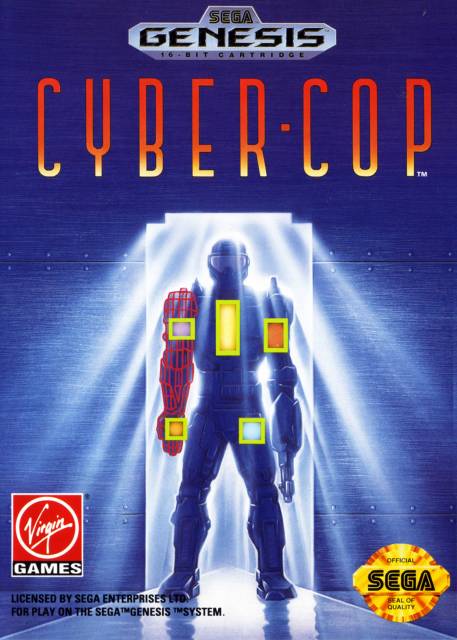
- Developer: Core Design
- Publisher: Virgin Interactive
- JP Release: N/A
- NA Release: September 1992 (as Cyber-Cop)
- EU Release: September 1992 (as Corporation)
- Franchise: N/A
- Genre: FPS
- Theme: Cyberpunk
- Premise: An agent of the Interpol-like ZODIAC is secreted into the HQ of one of the most successful genetic engineering corporations around to investigate a hostile experiment running amok.
- Availability: No rereleases. It came out on PC (DOS) too, but GOG hasn't gotten around to it yet.
- Preservation: Boy, it sure comes off as suspicious when a dystopic cyberpunk game called Corporation is forced to rename itself for the American market to something a little more "Blue Lives Matter". There's probably an innocuous reason (focus testing? A similarly named game, maybe?) but it sure seems like a sinister indictment of the country's extreme capitalist reality that this game is, in part, attempting to decry. Anyway, this was one of those "very serious computer games" I grew up with but could never figure out as an impatient youngster. A trailblazer in the first-person shooter genre, preceding Wolfenstein 3D by a couple of years, Corporation also tosses in a bunch of sim and RPG elements which makes it a little more involved than the average Doom clone. Imagine a Deus Ex built with 16-bit sprite-scaling tech and so ahead of its time it has no idea what it's doing, and you're mostly there. It seems like the kind of game that might prove rewarding if you were ever to suss out its systems... but maybe not one that works on game consoles without a mouse peripheral, as the in-game cursor locks onto everything automatically.
310: Crüe Ball
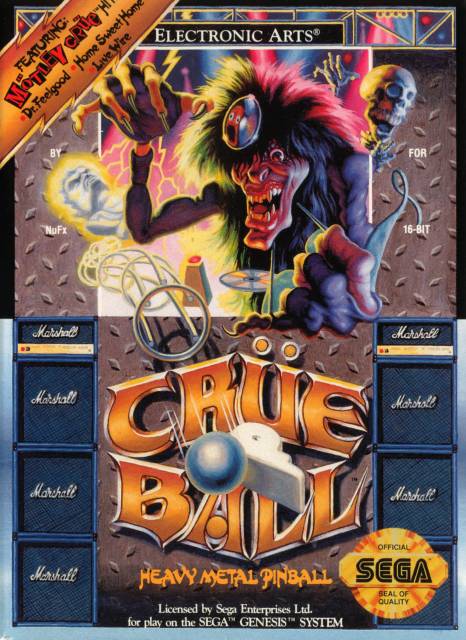
- Developer: NuFX
- Publisher: Electronic Arts
- JP Release: 1992-12-26
- NA Release: November 1992
- EU Release: September 1992
- Franchise: N/A
- Genre: Pinball
- Theme: Heavy Metal
- Premise: Weird to think that, for a nerdier part of a generation (mine specifically), the rock band people most readily associate with pinball is Mötley Crüe and not The Who. It's all thanks to this MIDI-empowered classic.
- Availability: If there exists a publisher that wants to give Mötley Crüe a huge sack of money to license this again, they probably have a few scrües loose.
- Preservation: I have to be careful here, as this is one of Jeff Gerstmann's many Genesis favorites (he recorded an Encyclopedia Bombastica for it back in the day, even) but I've personally never been a huge fan of pinball unless it involves Kirby or Pokémon in some capacity. Crue Ball's one of the few games of its genre to attempt to fit a more conventional video game progression onto pinball, where you can "complete" a table after fighting a "boss" and move onto a new table after a "bonus round". These in-between bonus rounds are a bit more like Arkanoid, knocking down little skull dudes as they wander around. The Mötley Crüe involvement is largely limited to three of their tracks - the most famous of which, Dr. Feelgood, plays over the title screen - and their mascot Allister Fiend, who pops up on the same title screen to obscure the options until you chase him off. Turns out most of the game had already been completed prior to the band's endorsement, rocking a heavy metal theme and its own headbanging tracks that probably fit seamlessly with whatever vision for a tie-in Nikki Sixx might have dreamed up.
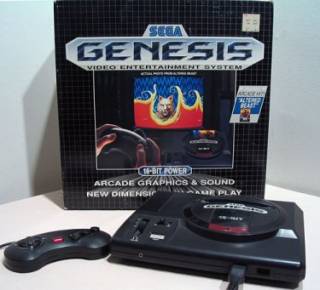
Log in to comment